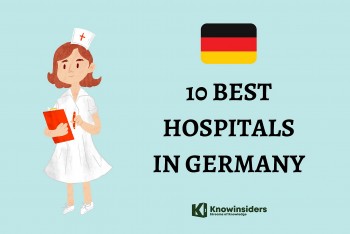EURO 2024 in Germany - Usefull Health Advice for Visitors: Websites, Phone Numbers, Weather and diseases
| Table of Contents |
Useful Websites and Phone Numbers During Travelling Germany for Euro 2024
• On-call medical service 116117: If the doctor's office is closed, call 116117 to reach the on-call medical service.
• Emergency medical care 112: In a medical emergency, call 112 to get in touch with the emergency services. It is better to talk to people in German or English. The staff present determines how well they can understand other European languages.
• Danger 112 or 110: If there is an immediate threat, call 112 for emergency services or 110 for the police.
• Acute mental crises 0800 1110111: This number can be used to call a doctor's office or a hospital in an acute mental crisis. Calling the helpline at 0800 1110111 (in German) will get you help over the phone.
► Download PDF file of "Public health advice for travellers attending UEFA EURO 2024"
Learn more: Top 10 Best Free Websites and Apps to Forecast Germany Weather Today
 |
| WHO - Public Health Advice for Euro 2024 |
Sun Exposure and Heat in Summer in Germany During Euro 2024
High temperatures are expected this summer in Germany, which can be very harmful to health. Long-term sun and heat exposure raises the risk of developing serious illnesses, some of which are fatal, linked to UV radiation and heat.
While at the event To avoid heat-related illnesses, carefully consider these safety precautions. Remember to check in with your friends and loved ones while you attend to your own needs.
To learn more about recognising and handling heat-related complaints, click this link to visit the website of the German Federal Center for Health Education. The German Weather Service issues heat warnings, which are available here, on days with high heat loads. To learn more about UV radiation and UV protection, click this link to visit the German Federal Office for Radiation Protection website. The WHO's heat-related health advice is provided here. To protect yourself from the sun and heat, keep in mind these tips:
Try to stay out of the heat whenever you can. Avoid direct sunlight and strenuous activities when the temperature is at its highest. Try not to leave children or pets in parked cars, and if you can, try to spend two or three hours each day in a cool place.
Keep your body cool and use sunscreen. Put on airy, loose-fitting attire. Whenever possible, wear sunscreen with an SPF of 30 or higher, even if you plan to spend time in the shade. For added protection, wear long, breezy, light-colored clothing and a hat. Always remember to shield your eyes with sunglasses.
Keep yourself hydrated. Remember to drink plenty of water. Sweating causes our bodies to lose a lot of water. Therefore, you should drink two to three liters of fluid throughout the day during a heatwave. Water and chilled teas without added sugar are the best beverages. Alcohol, caffeine, and sugar should all be consumed in moderation because they can cause dehydration and circulation problems.
Consume little. On hot days, avoid having large meals. For your several small meals throughout the day, opt for cool, fresh foods like salads, low-fat soups, dairy products, fruits, and vegetables.
Check the medications you currently take. Ask your doctor if the medication you take is heat-tolerant before you leave. Read the storage instructions carefully, especially in the summertime.
To avoid heat-related illnesses, carefully consider these safety precautions. Remember to check in with your friends and loved ones while you attend to your own needs.
On days with high heat loads, the German Weather Service issues heat warnings, which can be found here.
Water and food safety
The summertime's hot, muggy weather makes it easier for bacteria to spread quickly and contaminate food. It's possible for contaminated food to look, taste, or smell the same as healthy food. While some foodborne illnesses are minor and go away in a few days, others can be quite serious or even deadly. To stop food-borne illness transmission:
• make sure your food is fully cooked and wash your fruits and vegetables;
• Do not eat cooked or fast-food items that have been left out at room temperature for more than two hours; and
• Use soap and water to wash your hands often, or use hand sanitizer with alcohol, especially before and after going to the bathroom and touching food.
Use of alcohol, tobacco and cannabis
Alcohol
In Germany, acquisition, possession and consumption of alcohol are permitted.
• If you are an adult (18 years or older), you can buy any kind of alcohol in any amount.
• If you are at least 16 years old, you can buy beer and wine, but not liquor. People can usually drink alcohol in public, but there are some places, like on local public transportation, where it's not allowed. If you do decide to drink alcohol, be smart about it and don't drink too much.
Small amounts of alcohol can wake you up, but in general, it slows down brain activity. When taken in larger amounts, it can mess up your ability to focus and perceive things. Speech, coordination, and judgment may get worse over time. It is strongly not advisable to drive after drinking alcohol.
Germany will punish you if they catch you driving with a blood alcohol level (BAC) of just 0.3 milligrams per mille.
You can reach 0.3 per mille BAC if you drink the following amounts:
• approximately 0.1 litres of wine or 0.3 litres of beer for a 60 kg woman
• approximately 0.2 litres of wine or 0.5 litres of beer for an 80 kg man.
If you drink alcohol when it's hot, like in the summer in Germany, it can make your circulation worse, make you lose consciousness, and even cause your blood pressure to drop so low that it could kill you. For your health and safety, it's best to drink less or none at all.
Tobacco
Tobacco products and e-cigarettes can be bought, owned, and used in Germany after the age of 18.
It is illegal to give these items to people younger than 18 years old. Smoking, including using e-cigarettes, is illegal in most indoor public places, like restaurants, airports, and public transportation stations. However, some restaurants, some airports, and train stations do have smoking areas.
Smoking tobacco and being around tobacco smoke are very bad for your health. They can cause lung diseases and raise your risk of getting cancer. The best thing you can do for your health and the health of those around you is to stop smoking.
Cannabis
Starting April 1, 2024, adults in Germany who are 18 years or older will be able to legally use cannabis. They will also be able to carry up to 25 grams of cannabis with them in public.
Starting July 1, 2024, people who belong to non-profit "cannabis social clubs" will be able to grow and share their own cannabis for personal use.
But only people who live in the area are allowed to go to these clubs; tourists are not allowed. Unless these agreements are met, it is still illegal to buy, sell, or share cannabis.
In addition, it is prohibited to:
• consume cannabis in the presence of or near facilities for children and young people, including playgrounds, schools and sports facilities;
• consume cannabis in pedestrian zones between 7 am and 8 pm;
• pass cannabis to minors, which is punishable by law;
• import cannabis from abroad; and
• drive a vehicle under the influence of cannabis, as it severely impairs motor skills and increases accident risks.
Vaccination Against COVID-19
While COVID-19 is no longer an emergency, the virus is still spreading and putting people's lives at risk, especially those who are older, have long-term illnesses, are immunocompromised, or are pregnant. Getting a vaccine lowers the chance of getting really sick or dying. If you are at risk of getting severe COVID-19, check to see if you have been vaccinated against it and talk to your doctor about any doses you may need.
Respiratory viruses
Know your risk and keep other people and yourself safe from COVID-19 and other respiratory viruses. COVID-19 can be caught by anyone, but some groups are more likely to get very sick from it. This includes older people, women who are pregnant, people whose immune systems are weak, and people who have long-term illnesses.
Good hand and cough hygiene, making sure there is enough air flow inside, staying home when you're sick, and getting vaccinated as recommended by your country are all things you can do to protect yourself and others.
Masks and physical distance are suggested during times when the virus is spreading quickly in some places and among people who are more likely to get sick.
Infections transmitted through sex
It's important to stay healthy and avoid getting sick from having sex. In Europe, chlamydia, gonorrhea, and syphilis are some of the most common sexually transmitted infections (STIs).
Besides HIV, other diseases like hepatitis viruses and mpox can also be spread during sex. STIs and mpox can cause serious health problems if they are not treated, while HIV needs to be treated for life. Condoms can lower the risk of getting STIs and HIV if they are used correctly and regularly.
You can buy condoms in Germany at drugstores, pharmacies, and grocery stores. While a condom won't completely protect you from mpox, it may lower your risk or the amount of time you're exposed to it. Talk to your doctor in your home country about any shots or precautions you need, like Pre-Exposure Prophylaxis (PrEP) for HIV.
Keep in mind that PrEP does not protect against other STIs. For hepatitis A, hepatitis B, and mpox, there are vaccines that work. If you have had sex without protection or with more than one partner, you should get checked for STIs. Contact outpatient departments or HIV and STI specialist practices for post-exposure prophylaxis if you think you may have been exposed to HIV or mpox.
Tick-borne diseases
When you're outside, keep in mind that ticks are most active from April to September. Ticks don't just live in forests; they can also be found in city parks, gardens, and backyards, or anywhere else you might be watching football or enjoying other activities. Ticks can spread diseases like borreliosis (also known as Lyme disease) and tick-borne encephalitis (TBE), which can lead to serious long-term conditions or even death. To make it less likely that ticks will bite you:
• avoid walking in wooded and bushy areas, including offtrails;
• If you are in a bushy area or have been staying in a park:
◦ wear clothes that cover most body parts such as long sleeves and long trousers;
◦ tuck trouser legs into socks so that ticks cannot crawl up inside;
◦ wear light-coloured clothes to help you find ticks easily on clothes;
◦ use approved insect repellents on the skin and/or clothes following instructions – insect repellent should be applied on a child by an adult; and
• Check your skin and clothes for ticks often, especially after being outside. In Germany, travelers who are likely to come into contact with ticks and are going to a place with a high TBE risk should get a TBE vaccine.
How to Access to the Health System in Germany During Euro 2024
You continue to be covered by health insurance in your home country if you are a citizen or resident of an EU or EEA nation and are temporarily residing in Germany.
You will require your European Health Insurance Card (EHIC) and identity verification (passport or identity card) in order to receive medical care. If you have statutory health insurance in your country of origin, the EHIC is issued by your health insurance provider. An EHIC is not provided to owners of private insurance.
You can ask your health insurance provider for a temporary replacement certificate if you don't have an EHIC. In the event of an acute illness, you are entitled to medical care, hospitalization, and medication in Germany if you have statutory health insurance in another EU member state.
To prove your identity, you have to show the hospital or doctor your provisional replacement certificate or your EHIC. You will be treated in an emergency situation even if you do not have a health card.
What should I do if I become ill during Euro 2024 in Germany?
A family doctor's office is open to everyone who is sick. You will be sent to a certain specialist practice or hospital if it is necessary.
If the doctor's office is closed, you can call 116117 (in German) or visit https://www.116117.de/ to reach the on-call medical service. Here, you can see which doctor's office is on call in the late afternoon, at night, or on the weekends. The list is available in 10 languages.
For emergencies that could endanger your life or leave you seriously hurt, you can call 112 or go to the emergency room of a hospital.
What can I do in an emergency?
There are different phone numbers that can help in an emergency, including: What should I do if I get sick?
• Dial 112 to get free medical help right away:
◦ in case of medical emergencies, like being unconscious, short of breath, in a lot of pain, bleeding heavily, poisoning, paralysis, serious injuries, high fever, or a mental health crisis;
◦ if you are with someone who needs medical help right away, stay with them until help arrives; and
◦ in case of immediate danger (you can also call the police at 110).
• 0800 1110111 in an acute mental health crisis (free of charge, in German).
You can also visit a doctor’s office or hospital. For international helplines, see here.
 Top 10 Best Hospitals In Germany 2024/2025 Ranked by Newsweek and Statista Top 10 Best Hospitals In Germany 2024/2025 Ranked by Newsweek and Statista We've chosen ten such hospitals in Germany that are worth getting to know because they welcome overseas patients. Keeping them in mind may allow you ... |
How and where can I get medication during travelling to Germany for Euro 2024?
Pharmacies are typically the source of medication. Additionally, some emergency service pharmacies are open on the weekends and after hours.
This is the place to find out which pharmacy is open on the weekends, late into the evening, and so on. A prescription from a doctor is required for many medications. Anyone who needs to take medication on a regular basis—for instance, to treat diabetes or high blood pressure—needs a prescription from a physician, which can be obtained from a family physician.
Remember to pack your prescription drugs for any chronic illnesses you may have if you are heading to Germany for UEFA EURO 2024.
 Euro 2024: Download Official Wall Chart and Calendar with PDF files Euro 2024: Download Official Wall Chart and Calendar with PDF files Download our wall chart and calendar and chart your Euro 2024 team’s progress in Germany from June 14 to July 14 |
 Top 10 FREE Sites to Watch Euro 2024 Online from Spain (Without Cable) Top 10 FREE Sites to Watch Euro 2024 Online from Spain (Without Cable) Watching Euro 2024 online from Spain for free is possible through various platforms. Whether you’re a die-hard supporter or just looking to catch the key ... |
 When Do England Team Play Next at Euro 2024 - England Fixtures, Squads, Results When Do England Team Play Next at Euro 2024 - England Fixtures, Squads, Results The definitive guide to the England team's next game, future schedule, and Euro 2024 results. |

























